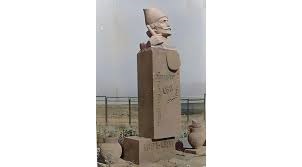 21 March 2023, 14:04
21 March 2023, 14:04
As the humanity celebrates today the World Poetry Day, and on the auspicious occasion of Novruz - a holiday imbued with the values of peace, reconciliation, and humanism - Azerbaijanis displaced from Western Azerbaijan hold a special appreciation in their hearts. Today marks the birth anniversary of Ashiq Alasgar, a luminary of Azerbaijani poetry and a shining embodiment of Goycha ashiq school.
Born in 1821 in Aghkilsa village of the Goycha District of Iravan Khanate, Ashiq Alasgar honed his craft under the tutelage of Ashiq Ali, another great master of the Goycha ashiq school.
With his unparalleled artistic and aesthetic mastery, Ashiq Alasgar breathed new life into the millennia-old traditions of ashiq art, creating works that harmoniously reflected the spirit of his people. His deeply evocative and patriotic creativity, infused with a love for his mother language and native nature, stands as a shining testament to the limitless possibilities of expression. His literary contributions, characterized with philosophical depth and poetic lyricism, have become an integral part of the canon of Azerbaijani literature.
Ashiq Alasgar formed a school of devoted and talented students, and his legacy inspired future generations of celebrated poets, writers and readers alike. His poetry helped Azerbaijani Ashiq art earn a place on the list of protected world intangible cultural heritage.
Thanks to the tireless efforts of National Leader Heydar Aliyev, the rich poetic heritage of Ashiq Alasgar has been extensively promoted. Celebrations of the artist's 150th jubilee were held at the highest levels of state, and a monument was erected to honor his memory in the village where he was born, located in the Goycha district of Western Azerbaijan.
The celebration of the 200th anniversary of Ashiq Alasgar by the Decree of Ilham Aliyev, the President of the Republic of Azerbaijan, the inclusion of Ashiq art in the list of intangible cultural heritage of UNESCO at the initiative of First Vice President Mehriban Aliyeva played a crucial role in perpetuating Ashiq Alasgar's work as the universal value.
However, with a heavy heart, it should be noted that the Armenian government destroyed Ashiq Alasgar's monument, as well as most of the Azerbaijani cultural heritage left there. While we, the Azerbaijanis who were expelled from Armenia, celebrate Ashiq Alasgar's birthday as a day of cherishing his legacy as the universal treasure, we also mourn on this day our destroyed cultural heritage in Western Azerbaijan.
We are still unable to visit Ashiq Alasgar's tomb, nor any of our other cultural heritage sites, holy places, and cemeteries that we had to leave behind in Armenia. Our pleas to the international community for access to these sites remained unanswered. We are still waiting for an answer to our appeal to Charles Michel, the President of the Council of the European Union, which sent a mandated mission to Armenia to implement confidence-building measures.
Repeated appeals by the Azerbaijani public to UNESCO requesting the latter to send a mission to Armenia to monitor the state of the Azerbaijani cultural heritage there, remain unanswered.
Armenia's ethnic cleansing has not only caused damage to our cultural monuments but also to our intangible heritage such as the art of Ashiq, which is recognized by UNESCO. as the cultural heritage of humanity. Therefore, facilitating the safe and dignified return of Azerbaijanis expelled from Armenia is a task for the mankind in terms of restoration and safeguarding the cultural heritage that has been destroyed and endangered by Armenia.
Considering all these, we renew our appeal to the international community to help the Azerbaijanis expelled from the territory of Armenia to return to their homes in a safe and dignified manner within the framework of the international process and to ensure their individual and collective rights after returning, as well as to assist in restoring the destroyed Azerbaijani cultural heritage there.
In addition, the Community demands that the Armenian government immediately stop the destruction of Azerbaijani cultural heritage there.
The Community also calls on UNESCO to assess the state of cultural heritage belonging to Azerbaijanis on the territory of Armenia, including the preparation of a list of the pieces of cultural heritage that have been damaged and obliterated, and to ensure that the Armenian government fulfills its obligation to restore and protect them.



